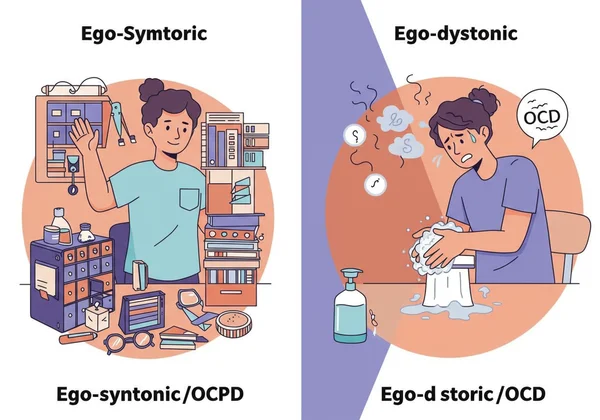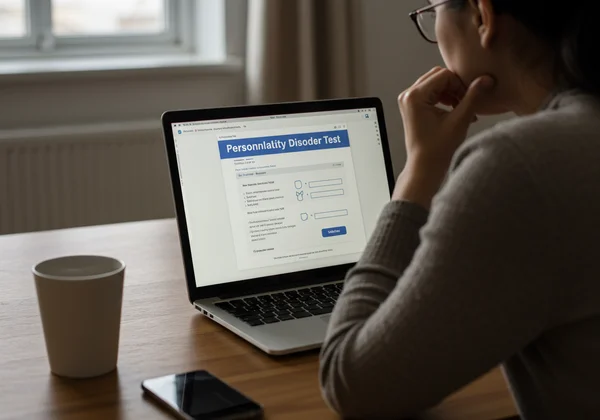OCPD: More Than Perfectionism? Take a Personality Disorder Test
August 26, 2025 | By Samuel Bishop
Are you someone who thrives on order, meticulously plans every detail, and struggles when things aren't "just so"? While perfectionism can be a powerful driver of success, there's a point where the relentless pursuit of flawlessness can become rigid, inflexible, and disruptive. This is where the line between a personality trait and a potential personality disorder can blur. If you've ever wondered if your need for control goes deeper than a simple quirk, you're in the right place. This article explores Obsessive-Compulsive Personality Disorder (OCPD), and a personality disorder test can offer the first step toward clarity. How do I check if I have a personality disorder? For many, the journey begins with self-awareness, and a screening tool like the one offered on our personality disorder test platform can provide valuable initial insights.
What Exactly is Obsessive-Compulsive Personality Disorder (OCPD)?
Obsessive-Compulsive Personality Disorder (OCPD) is a personality disorder characterized by a pervasive pattern of preoccupation with orderliness, perfectionism, and mental and interpersonal control, at the expense of flexibility, openness, and efficiency. Unlike other conditions that may come and go, these traits are an ingrained part of an individual's personality, shaping how they see the world and interact with others from early adulthood onward.
For someone with prominent OCPD traits, the world is a place that must be carefully managed. Their internal rules and standards are the only "right" way to do things, and deviation from this path can cause significant distress and frustration—not just for them, but for those around them.

Defining Key OCPD Traits and Characteristics
While everyone exhibits some of these behaviors from time to time, in OCPD, they form a persistent and inflexible pattern. The core features often include a deep-seated need for control over one's environment. This isn't just about being tidy; it's about a fundamental belief that structure and adherence to rules are necessary to prevent catastrophe.
Other key personality traits include:
- Preoccupation with Details and Rules: An individual might get so lost in creating the perfect list or schedule that they lose sight of the overall goal of the project.
- Excessive Devotion to Work: Productivity is often prioritized above all else, including leisure activities and personal relationships, to a degree that is not accounted for by economic necessity.
- Inflexibility and Rigidity: There is often a strict adherence to moral or ethical codes, and a tendency to be judgmental of others who do not share their high standards.
- Reluctance to Delegate: A person with OCPD traits may believe that no one else can perform a task correctly, leading them to refuse help and become overwhelmed.
- Miserliness: A stingy spending style is common, with money often being hoarded for future, unforeseen disasters.
DSM-5 Criteria for OCPD: A Clinical Overview
To ensure we're grounded in established psychological principles, it's helpful to look at the Diagnostic and Statistical Manual of Mental Disorders (DSM-5). This is the guide used by mental health professionals. The DSM-5 outlines that OCPD involves a pervasive pattern of preoccupation with orderliness, perfectionism, and control, as indicated by four (or more) specific criteria.
These criteria provide a framework for understanding how mental health professionals identify these patterns. Referencing these standards helps ensure that tools like an online free personality disorder test are scientifically informed, even though they are not a substitute for a clinical diagnosis. This commitment to a recognized framework is crucial for building trust and providing responsible guidance.
OCPD vs. OCD: Understanding the Key Differences
One of the most common points of confusion is the difference between OCPD and Obsessive-Compulsive Disorder (OCD). While their names sound similar, they are distinct conditions with different core features. Understanding this distinction is vital for self-awareness and seeking the right kind of support. This is a primary reason people seek out an obsessive compulsive personality disorder test.
Is It Ego-Syntonic or Ego-Dystonic?
This psychological concept is the most important distinction. OCPD is considered ego-syntonic. This means the individual with OCPD traits generally does not see their way of thinking and behaving as a problem. In fact, they often believe their methods are superior and that others are the ones who are too careless or inefficient. Their need for order and perfection feels natural and correct to them.
In contrast, OCD is ego-dystonic. A person with OCD experiences their obsessive thoughts and compulsive behaviors as intrusive, distressing, and alien. They are often aware that their rituals (e.g., repeated hand-washing, checking locks) are irrational but feel powerless to stop them. The compulsions are a source of significant anxiety and are not aligned with their self-concept.

Focus on Order vs. Obsessive Rituals & Compulsions
The second key difference lies in the manifestation of symptoms. OCPD is about a pervasive personality style centered on order, perfection, and control in all aspects of life. A person with OCPD might spend hours organizing a bookshelf by color and size simply because it feels like the "right" way to do it.
OCD, however, involves specific obsessions and compulsions. Obsessions are unwanted, intrusive thoughts or images that cause anxiety (e.g., fear of contamination). Compulsions are repetitive behaviors or mental acts that the person feels driven to perform to reduce that anxiety (e.g., washing hands 50 times). These rituals are not about general perfection but are aimed at neutralizing a specific fear.
Recognizing the Signs & Symptoms of OCPD in Daily Life
Identifying the signs of OCPD involves looking at how these ingrained traits affect everyday functioning. Because these behaviors are ego-syntonic, the person exhibiting them may not recognize them as problematic. Often, it is family, friends, or coworkers who first notice the negative impact.
Common Behavioral Patterns in OCPD
In daily life, OCPD symptoms can manifest in various ways. At home, an individual might impose rigid rules on family members about cleanliness or daily routines, becoming upset when these are not followed precisely. They may struggle with spontaneity and find it difficult to relax on vacation without a detailed itinerary.
Another common pattern is difficulty finishing projects. The perfectionistic standards are so high that they get stuck on minor details, preventing them from meeting deadlines. This is often paired with an inability to delegate tasks, as they are convinced no one else can meet their exacting standards. Hoarding worn-out or worthless objects because "you never know when you might need them" can also be a sign.
How OCPD Impacts Relationships and Work
The rigidity and need for control inherent in OCPD can place a significant strain on personal and professional relationships. Partners and family members may feel constantly criticized, controlled, and unable to meet impossibly high expectations. The person with OCPD traits may appear emotionally reserved, as expressing feelings can seem messy and inefficient.
In the workplace, they might be seen as dedicated but can also be difficult colleagues. Their micromanaging tendencies can stifle creativity and morale among team members. While their attention to detail can be an asset, their inflexibility and focus on minor points can hinder overall productivity and collaboration. Recognizing these patterns is a key step, and an initial screening from a personality disorder test free of charge can be an eye-opener.

Taking the First Step: Seeking Support for OCPD Traits
If you recognize these patterns in yourself or a loved one, it's important to remember that awareness is the first and most powerful step toward change. While OCPD traits are deeply ingrained, they are not a life sentence. With the right support and strategies, it is possible to learn flexibility and improve quality of life.
The Role of Self-Awareness and Screening Tools
Before seeking professional help, many people find it useful to start with self-reflection. This is where a confidential, scientifically-informed screening tool can be incredibly helpful. Taking a free screening tool allows you to answer a series of insightful questions in private, helping you connect the dots between your behaviors and established psychological patterns.
The goal of such a test is not to provide a diagnosis but to offer preliminary insights. It can validate your concerns and give you a structured way to understand what you're experiencing. The results can serve as a valuable starting point for a conversation with a mental health professional, should you choose to take that step.

Exploring Professional Guidance and Therapy Options
If your screening results or personal reflections indicate that OCPD traits are significantly impacting your life, seeking professional guidance is a logical next step. Therapies such as Cognitive-Behavioral Therapy (CBT) and Psychodynamic Therapy have proven effective in helping individuals with OCPD.
A therapist can help you challenge rigid thought patterns, develop greater emotional awareness, and practice more flexible behaviors. They can provide a safe space to understand the root of your need for control and help you improve your relationships. Remember, seeking help is a sign of strength and a proactive step toward a more balanced and fulfilling life.
Your Path Forward: Embracing Clarity
Understanding the difference between a strong work ethic and excessive devotion, or between being organized and being rigidly controlled, is crucial. Obsessive-Compulsive Personality Disorder is more than just perfectionism; it is a pervasive pattern that can limit spontaneity, strain relationships, and diminish overall life satisfaction. Recognizing these traits is the first crucial step toward managing their impact.
If you resonate with the patterns discussed in this article, you are not alone. Gaining self-awareness is your first move toward building a more flexible and fulfilling life. We encourage you to take the test on our homepage. It’s a confidential, user-friendly, and scientifically-informed way to get initial insights and explore clear, actionable next steps on your journey of self-discovery.
Frequently Asked Questions About OCPD & Personality Disorder Tests
What's the difference between OCPD and OCD?
The primary difference is that OCPD is a personality disorder involving a pervasive, lifelong pattern of orderliness and control that the individual sees as normal (ego-syntonic). OCD is an anxiety disorder characterized by unwanted, distressing thoughts (obsessions) and irrational rituals (compulsions) that the individual often recognizes as a problem (ego-dystonic).
How can I tell if my perfectionism is OCPD?
Healthy perfectionism is a flexible trait that drives you to do well. With OCPD, perfectionism becomes an end in itself, often at the expense of efficiency and relationships. If your need for things to be "perfect" causes you to miss deadlines, alienates others, and leaves no room for flexibility or compromise, it may be leaning toward OCPD traits. An online screening can help you explore these patterns.
Is OCPD a treatable condition?
Yes, while personality traits are stable, they are not unchangeable. With commitment and professional support, individuals with OCPD can learn to become more flexible, improve their relationships, and reduce the distress caused by their rigidity. Therapies like CBT are often effective in helping individuals challenge and modify their core beliefs and behaviors.
How accurate are online personality disorder tests for OCPD?
Reputable online tests, like the one on our site, are designed as preliminary screening tools, not diagnostic instruments. They are scientifically informed and based on criteria like those in the DSM-5 to provide you with reliable initial insights into your personality patterns. Think of it as a compass pointing you in the right direction for self-exploration or professional consultation. A formal diagnosis can only be made by a qualified mental health professional.